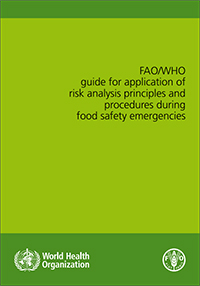Incidents, emergencies, crises
Food safety events that require intervention to protect the health of consumers have different levels of impact, ranging from minor incidents to major crises. When food safety is compromised, issues can quickly evolve from a local problem to an international incident or emergency. So it is critical to ensure that both governments and food business operators are able to prevent and control food safety risks.
FAO works with countries to develop capacities and systems that will help prevent food safety emergencies and strengthen their preparedness to manage events when they happen.
INFOSAN: Connecting countries
Jointly with WHO, FAO leads an international network of national food safety authorities. The aim of the network is to prevent, communicate and respond to food safety incidents and emergencies in international food trade. FAO works with countries to encourage all the relevant policy- and decision-makers in food safety – including in the ministries of agriculture and trade – to actively participate in the FAO/WHO International Food Safety Authorities Network (INFOSAN).
Collaborating across sectors and exchanging timely information across borders enhances the containment of affected food spread and related foodborne diseases in the context of food safety emergencies. Maintaining food safety risk communication and developing capacities to respond effectively to emergencies is at the core of INFOSAN work.
Food safety management within a crisis
Extreme weather events, disasters, pandemics and economic shocks can abruptly stop or damage food production, compromising the safety of the commodities or products and affecting food security and nutrition. As part of its support to countries in preparing for and responding to crises, FAO helps develop early warning capability, build resilience and ensure the availability of safe food.
Food safety is part of FAO’s work on One Health as the health of people is intrinsically linked to that of animals and the environment, where food is sourced. Safeguarding food all along the supply chain will reduce foodborne illness and help keep the supply continuous.
COVID-19
The COVID-19 pandemic is a global crisis that has affected the food and agriculture sector. FAO is playing a role in assessing and responding to its potential impacts on people’s lives and livelihoods, global food trade, markets, food supply chains and livestock.
Read more about the FAO COVID-19 Response and Recovery Programme
While there is no evidence that food can transmit the virus COVID-19 to humans, the effects of the pandemic has caused disruptions to food systems in different parts of the world. FAO is working with Members and partners to support response and recovery efforts.
See more about FAO’s work on ensuring food safety during the COVID-19 pandemic.



